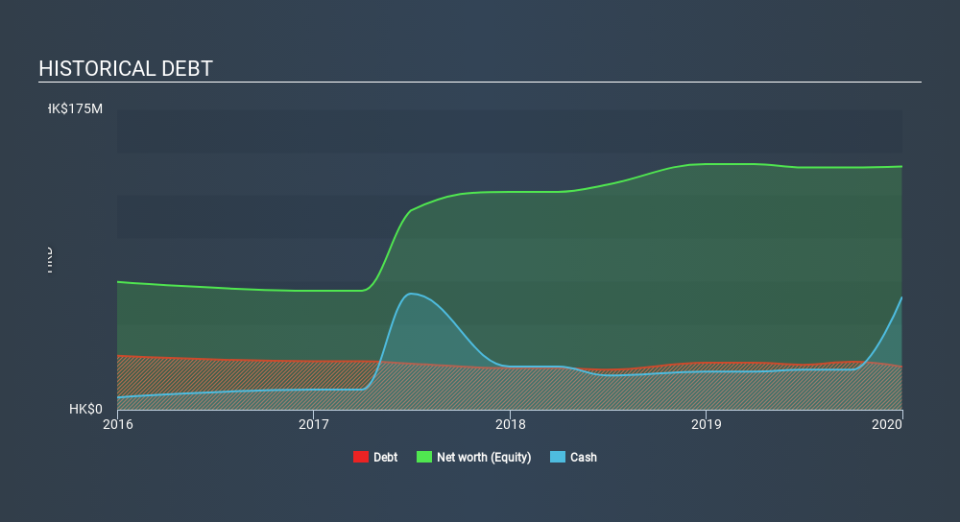Does Winning Tower Group Holdings (HKG:8362) Have A Healthy Balance Sheet?

The external fund manager backed by Berkshire Hathaway's Charlie Munger, Li Lu, makes no bones about it when he says 'The biggest investment risk is not the volatility of prices, but whether you will suffer a permanent loss of capital. So it seems the smart money knows that debt - which is usually involved in bankruptcies - is a very important factor, when you assess how risky a company is. We note that Winning Tower Group Holdings Limited (HKG:8362) does have debt on its balance sheet. But should shareholders be worried about its use of debt?
When Is Debt A Problem?
Debt assists a business until the business has trouble paying it off, either with new capital or with free cash flow. Ultimately, if the company can't fulfill its legal obligations to repay debt, shareholders could walk away with nothing. However, a more frequent (but still costly) occurrence is where a company must issue shares at bargain-basement prices, permanently diluting shareholders, just to shore up its balance sheet. Of course, the upside of debt is that it often represents cheap capital, especially when it replaces dilution in a company with the ability to reinvest at high rates of return. The first thing to do when considering how much debt a business uses is to look at its cash and debt together.
View our latest analysis for Winning Tower Group Holdings
How Much Debt Does Winning Tower Group Holdings Carry?
You can click the graphic below for the historical numbers, but it shows that Winning Tower Group Holdings had HK$25.1m of debt in December 2019, down from HK$27.4m, one year before. However, its balance sheet shows it holds HK$65.3m in cash, so it actually has HK$40.2m net cash.
A Look At Winning Tower Group Holdings's Liabilities
The latest balance sheet data shows that Winning Tower Group Holdings had liabilities of HK$18.3m due within a year, and liabilities of HK$36.3m falling due after that. Offsetting this, it had HK$65.3m in cash and HK$17.7m in receivables that were due within 12 months. So it can boast HK$28.5m more liquid assets than total liabilities.
This surplus strongly suggests that Winning Tower Group Holdings has a rock-solid balance sheet (and the debt is of no concern whatsoever). With this in mind one could posit that its balance sheet is as strong as beautiful a rare rhino. Simply put, the fact that Winning Tower Group Holdings has more cash than debt is arguably a good indication that it can manage its debt safely. There's no doubt that we learn most about debt from the balance sheet. But it is Winning Tower Group Holdings's earnings that will influence how the balance sheet holds up in the future. So when considering debt, it's definitely worth looking at the earnings trend. Click here for an interactive snapshot.
Over 12 months, Winning Tower Group Holdings saw its revenue hold pretty steady, and it did not report positive earnings before interest and tax. While that's not too bad, we'd prefer see growth.
So How Risky Is Winning Tower Group Holdings?
We have no doubt that loss making companies are, in general, riskier than profitable ones. And the fact is that over the last twelve months Winning Tower Group Holdings lost money at the earnings before interest and tax (EBIT) line. And over the same period it saw negative free cash outflow of HK$690k and booked a HK$7.6m accounting loss. But the saving grace is the HK$40.2m on the balance sheet. That means it could keep spending at its current rate for more than two years. Even though its balance sheet seems sufficiently liquid, debt always makes us a little nervous if a company doesn't produce free cash flow regularly. When analysing debt levels, the balance sheet is the obvious place to start. However, not all investment risk resides within the balance sheet - far from it. Consider for instance, the ever-present spectre of investment risk. We've identified 4 warning signs with Winning Tower Group Holdings (at least 2 which are potentially serious) , and understanding them should be part of your investment process.
Of course, if you're the type of investor who prefers buying stocks without the burden of debt, then don't hesitate to discover our exclusive list of net cash growth stocks, today.
If you spot an error that warrants correction, please contact the editor at editorial-team@simplywallst.com. This article by Simply Wall St is general in nature. It does not constitute a recommendation to buy or sell any stock, and does not take account of your objectives, or your financial situation. Simply Wall St has no position in the stocks mentioned.
We aim to bring you long-term focused research analysis driven by fundamental data. Note that our analysis may not factor in the latest price-sensitive company announcements or qualitative material. Thank you for reading.


